Congressmen With Sons in Iraq
It is often noted that relatively few Members of Congress have served in the Armed Forces and that their sons and daughters are quite unlikely to have to fight in the wars that they authorize. CNN highlights a few Members who do have a very personal stake in the Iraq War.
Lawmakers share parents’ fears
For more than a year, Rep. Joe Wilson’s desk at the House Armed Services Committee was the intersection of his personal and political interest in the Iraq war. On the table were bills about how to pay for and supply the conflict. Underneath, a handheld computer buzzed with real-time reports from his son Alan, an intelligence officer in southern Iraq. “I would get a ‘Hey Dad’ message almost every day,” the South Carolina Republican recalls. “I felt like I was voting on legislation, but I was living it simultaneously.”
For about half a dozen members of Congress who have had kids serving in Iraq, the war is far more than a matter of public policy. They debate it and often defend it — with eyes on public opinion, like almost any elected official. But they also live the war through those most dear to them. Therein lies a lesson about the limits of power. Lawmakers may be able to shift billions of dollars to pet projects or get seats at a state dinner. But none has the muscle to keep a child safe in a war zone, half a world away.
So at 6 a.m. on February 25, when his radio delivered the not-uncommon news that three Marines were killed in Iraq, Sen. Kit Bond felt it in his gut. “Tightness in my stomach,” Bond, R-Missouri, recalled, a jaw muscle flexing at the memory. “An involuntary reaction.” Bond’s only child, Samuel, 24, had left for Iraq just three days earlier to serve as an intelligence officer in the Marines. Samuel was safe that day.
Of course, six out of 535 Members is still a tiny percentage (1.1%). The article actually mentions only five, four Republicans (Wilson, Bond, Rep. Todd Akin of Missouri, and Rep. Duncan Hunter of California), and one Democrat (Sen. Tim Johnson of South Dakota).
Update/correction (1035): A couple of commenters have questioned whether this percentage isn’t actually rather high given the age of the typical Member. A fair point. I can’t find demographic data with which to compare. The 1.1% Members (even 0.9% if the five listed is the complete set) is likely high compared to others in their wealth/education bracket. It would almost certainly be higher, too, if grandchildren were factored in.

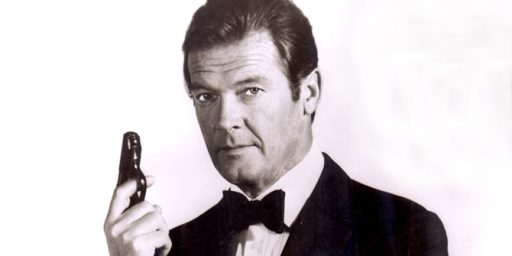
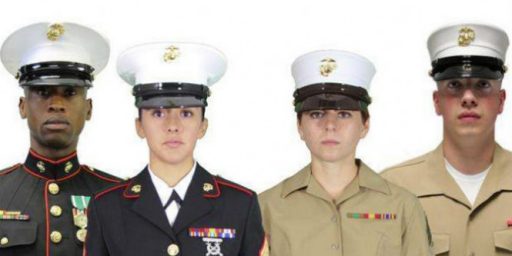
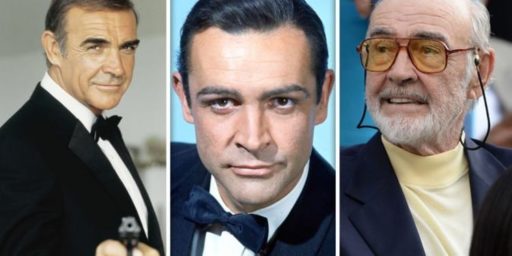
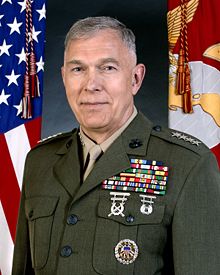
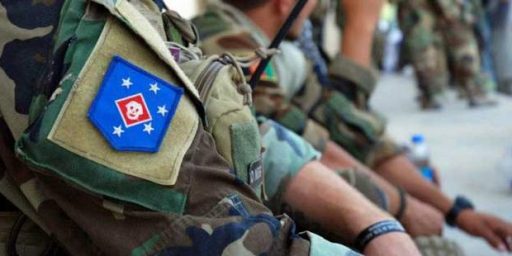
Although I am betting the percentage of troops in Iraq verses the general population is any higher than 1.1%.
I think what is more interesting is that the majority of the children in combat are the kids of republicans, and the one kid of the democrat is a democrat from a state where democrats tend to be of the more conservative variety.
Just did the math, and the percentage of troops verses population is .05%, granted you have to factor in that some people in the general population are too young to have kids, but then many members of congress have kids who are too young or too old to be in the military.
Considering the age of most of our senators, I wonder if that number increases significantly if you include grandchildren!
We seem to be creating political dynasties where military service is still a plus.
I watched “Saving Private Ryan” again yesterday because I was sick and tired of being sick and tired of the Nichols sensation that Fox would just not let go (enough already!).
I am reminded of the sacrifice of the mother as it was an altogether fitting presentation of the sacrifices that patriotic Americans made for generations until the baby-boomers decided that freedom was free and anything goes because they are not going to fight.
I’m sure they have the ever-lasting gratitude of all those fortunate people in Cambodia, Laos, and South Vietnam.
Where are the patriots today?